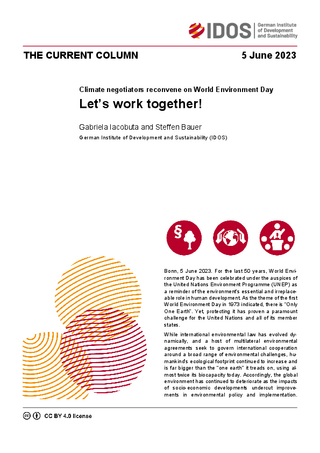Climate negotiators reconvene on World Environment Day
Let’s work together!
Iacobuta, Gabriela / Steffen BauerThe Current Column (2023)
Bonn: German Institute of Development and Sustainability (IDOS), The Current Column of 5 June 2023
Bonn, 5 June 2023. For the last 50 years, World Environment Day has been celebrated under the auspices of the United Nations Environment Programme (UNEP) as a reminder of the environment’s essential and irreplaceable role in human development. As the theme of the first World Environment Day in 1973 indicated, there is “Only One Earth”. Yet, protecting it has proven a paramount challenge for the United Nations and all of its member states.
While international environmental law has evolved dynamically, and a host of multilateral environmental agreements seek to govern international cooperation around a broad range of environmental challenges, humankind’s ecological footprint continued to increase and is far bigger than the “one earth” it treads on, using almost twice its biocapacity today. Accordingly, the global environment has continued to deteriorate as the impacts of socio-economic developments undercut improvements in environmental policy and implementation. Countless plant and animal species have been terminally lost already with many more threatened by extinction. In parallel, the average global temperature has increased by 1.1°C with major impacts around the world. Across all major assessment reports the science is crystal clear: achieving socio-economic goals within planetary boundaries will require urgent and transformative change.
Global environmental agreements have individually led to positive shifts towards such change, but lag far behind what is needed still. To boost their comparative strength and, indeed, coherent and effective implementation, stronger integration will be essential. First, socio-economic drivers are common across multiple environmental issues. Second, it is not only socio-economic development that can lead to environmental damage, but also environmental measures can, at times, adversely affect one another. For instance, extensive plantations of biofuels and non-native forest plantations to address climate change can lead to biodiversity loss, while ecosystems restoration through slow regrowth can limit the potential for more rapid carbon sequestration. Third, environmental change that remains unaddressed in one area may prompt domino effects for others. In that regard, global heating stands out as the biggest human-induced environmental threat: its ubiquitous impacts have far-reaching consequences for life on land and below water.
Reflecting the overarching risk of “dangerous climate change,” the United Nations Framework Convention on Climate Change (UNFCCC) was adopted at the Rio Earth Summit in 1992 and has held numerous semi-annual negotiations since. Today, parties to the UNFCCC and its 2015 Paris Agreement are reconvening for two weeks of negotiations in Bonn for the latest session of its Subsidiary Bodies. These technical meetings serve to support the implementation of the decisions of the more political annual UN climate change conferences (better known as COPs). As such, “the SBs” are key to advancing the implementation of the Paris Agreement in particular.
At the heart of this year’s agenda is the “Global Stocktake” which aims to determine progress made towards the implementation of the Paris Agreement. Moreover, it considers the broader impacts of climate response measures and the losses and damages already incurred due to climate change. It is no surprise that the results are clear: climate action remains highly insufficient in terms of both reducing greenhouse gas emissions and in adapting to climate change impacts. In effect, this puts all of the Sustainable Development Goals (SDGs) at risk all the while our environment as we know it is being irretrievably changed by intensified forest fires, loss of terrestrial and marine biodiversity due to increased temperatures, water scarcity and desertification as a result of droughts, acidified oceans, salinised coastal areas, melting glaciers and permafrost, and even changing ocean currents.
Importantly, the impacts of response measures are now getting more attention under the Global Stocktake. Nevertheless, these discussions so far remain largely focused on the social dimension with the aim to enable just transitions, and environmental impacts receive limited attention. Yet, this would be crucial to shed light on the strong link between climate action and other environmental issues and to ensure that synergies can be maximised and trade-offs avoided or at least limited. To that end, a stronger and systematic exchange with the multitude of pertinent multilateral environmental agreements would be key. Enhancing policy integration across the UNFCCC and the Convention on Biological Diversity is an obvious vantage point, given the relevance of “nature-based solutions” in both fields. Yet, it must not stop there. Indeed, synergies and trade-offs will also need to be identified and addressed across further conventions and MEAs ranging from the UN Convention to Combat Desertification to treaties addressing a broad range of hazardous wastes, pollutants and chemicals, like the Montreal Protocol on substances that deplete the ozone layer, or highly specialised concerns of species and ecosystems conservation, like the Ramsar Convention on Wetlands.
UNEP and its United Nations Environment Assembly would have a strong role to play in coordinating such efforts. Not only is it the organizational home of the majority of MEAs in question, but it would also reaffirm the original mandate UNEP was given by the UN General Assembly five decades ago, prompting inter alia the establishment of the World Environment Day. Having the current climate talks coincide with the 50th return of the World Environment Day should therefore serve as a stark reminder that climate and environmental action really are two sides of the same coin. The important links between climate change and the environment more broadly must be better appreciated and addressed. Ultimately, the transition to low-carbon and climate resilient societies is unfeasible without protecting the environmental fundament upon which these societies can develop and thrive. Economic concerns and development aspirations must no longer serve as a pretext for lukewarm climate action, but quite to the contrary ambitious climate action is an imperative for equitable and just sustainable development. To that end, climate action and environmental governance must work together.



